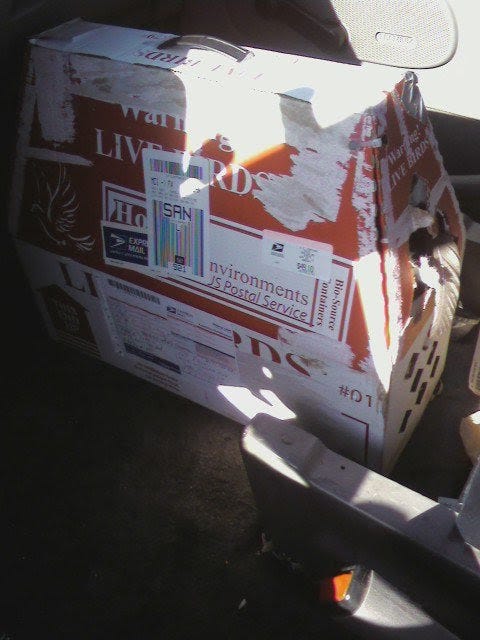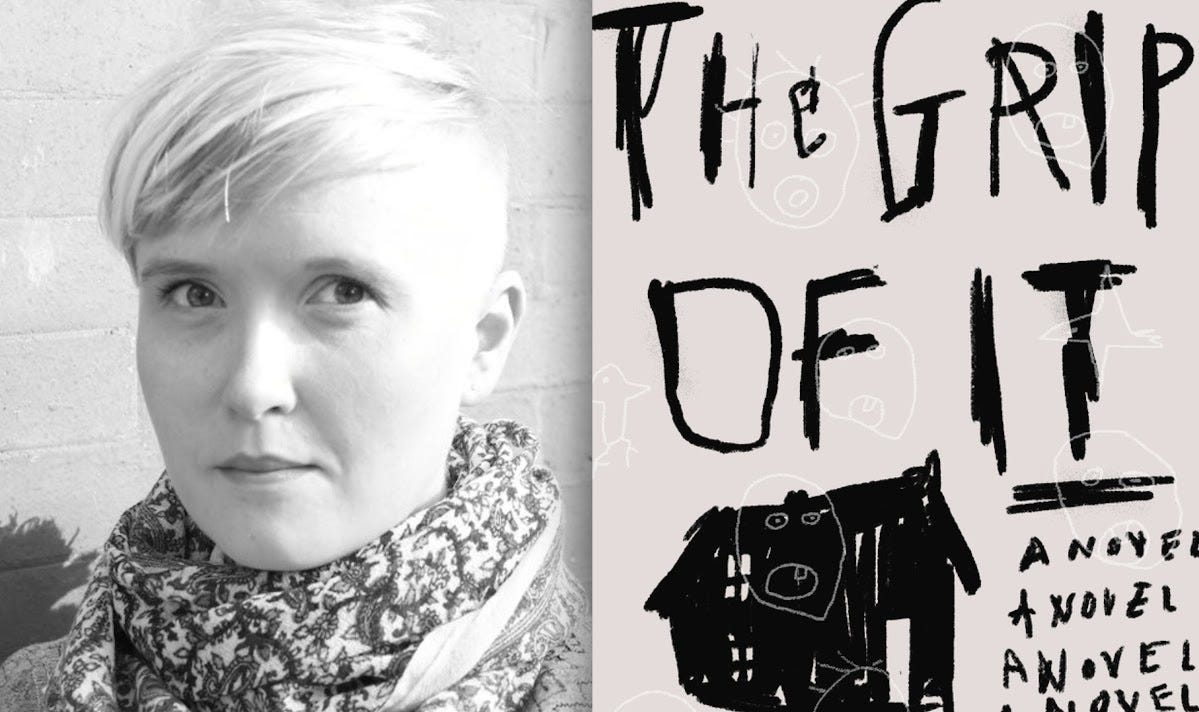You can send a live, honest-to-God rooster through the mail
And other life lessons learned from delivering mail for the USPS

The USPS is in trouble these days. If you’ve been following the news, you’re probably a little familiar with the ways in which Trump is preemptively trying to undermine mail-in ballot results while his lackey, Postmaster Louis DeJoy, tries to dismantle the agency he leads. But the truth is, the USPS has been in trouble, at least as far back as far as I can remember. Remember when email was going to kill it? Remember when they were going to cut Saturday service? I mean, I don’t want to take the current situation lightly, but the USPS is scrappy. It perseveres.
Ten years ago, I carried mail for the USPS in San Diego as a transitional letter carrier (TE). It was simultaneously the best/worst job I’ve ever had. It was the best because I got to walk around outside all day. It was the worst because of all the backbreaking labor, abusive management, working six days a week, vicious dogs, unrealistic deadlines, stress, lack of job security, paper cuts, awful customers, and — due to my transitionary status — very little union representation despite paying union dues.
Still, despite how much that job broke my spirit, body and mind, I will always love the post office. I witnessed first-hand the amount of work it takes to get mail into every home, six days a week. And I can’t say enough good things about letter carriers, who are modern MacGuyvers when it comes to problem-solving. Regular carriers have their routes memorized, and most likely know your house better than you. I got to a point when I could make jokes based on address numbers alone. Don’t get me started on ole 2498!
Near the end of my tenure as a letter carrier, I began carrying around a disposable camera and would take photos of vicious dogs, because the letter carrier/dog animosity is real and I wanted to document it. I turned the pictures into a photo essay that went viral and was eventually picked up by NPR.

This caught the attention of a literary agent, who reached out to see if I had any interest in writing a book about my experience carrying mail. “Doi” I think was my response. Over the next few months, I worked with her to develop a 40-page book proposal, including sample chapters. It was a very good proposal, I daresay.
But shortly after I completed it, the agent accepted a job at another agency, and didn’t take me along. I essentially fell through the cracks, along with this proposal that I worked on for months, which — I’ve learned since then — is kind of how the publishing world works. You lose more than you win. The industry’s a cruel beast.
But all this stuff happening at the USPS lately has prompted me to dust off the proposal share some of it with you. This is different from the mailman diaries I published in The Reader many, many years ago. I hope you enjoy, and please be nice to your letter carrier.

You can send a live, honest-to-God rooster through the mail.
I know this because I’m delivering one.
Overnight express. To an apartment complex.
According to the United Postal Service website, these are the following live animals that you can send through the mail:
· Live bees
· Adult fowl
· Scorpions!
· Other small, harmless cold-blooded animals
Obviously, there are stipulations for delivering live animals. For instance, honeybees are frosted – put in little bee comas – and shipped via ground, but the honey-queen has the privilege of air transport. For day-old poultry, the time and date of hatching must be marked on the box, which must arrive at its destination within 72 hours. And live scorpions can only be shipped for antivenom purposes or delivered to Bond super-villains too cheap to use FedEx.
I stand in front of the dilapidated apartments and hold the specialized container holding the live adult fowl like an oversized lunch box. The bird pokes its beak through the cardboard and squawks a sad little song. A woman walks by, bares a gold-plated smile.
“Nice cock,” she says.
I say thanks.
I try thinking of ways to get out of delivering the bird. Not that I have a particular fondness for roosters, but I can’t help but imagine it’s experiencing the worst morning-after ever: waking up in an uncomfortable bed not your own, hungry, dehydrated and in a strange neighborhood. It squawks again and I think how unfair it is that swans are the only bird with a signature death song. This rooster and I both know what’s going to happen to it.
My phone rings. It’s my supervisor, Greg. Greg never says hello when I answer the phone.
“Bradford, you still have that bird.” He only talks in flat, harsh statements and conversely, my answers always have the upward pitch of a question.
“Yes?” I say.
“Crissakes, you left with it 20 minutes ago. The customer just called asking for it. What have you been doing? Never mind. Just deliver it and get back here. Spencer called in sick and I need you to take another hour and a half off his route.” He hangs up.
“It’s you or me,” I whisper to tell the rooster. I reach for the keys hanging off my belt and realize they’re useless. The lock-box that holds the key for the gate is busted and the key is missing. I try all the keys on my belt. Nothing works. I set the bird down and climb the fence. Once over, I reach through the fence and lift the bird, hand over hand, until I have it over my head.
The customer is a robust man who wears smoky aviators and fiddles with a giant, plastic diamond on his pinky finger. His shirt is covered with what I hope is barbeque sauce. But that’s not what I notice at first.
It’s the smell.
It smells delicious.
“You have my bird?” the man asks.
“I just need your signature right here.” The man’s absurd pinky ring keeps getting in the way of his pen. I hand the box over to him. He lifts the box to his ear and shakes it like a Christmas present. “Is it going in… there?” I ask, nodding toward his kitchen.
“What?”
“Is it food?” I point to the box.
The man raises an eyebrow, looks at the box and then looks behind him. He then laughs. “Thank you,” he says, before closing the door.
My scanner beeps, demanding the information written on the man’s pink delivery slip. I can’t make out the print or signature, so I type in my boss’ name. I hope if there’s ever an underground cock-fighting ring discovered in the heart of City Heights, police will track it back to my boss.
I set my foot on the gate to climb back over when another tenant walks up, turns the door-knob and lets herself in. I hadn’t even tried the knob.
I sit in the stale air of the mail truck. I still have five hours’ worth of mail left to deliver, plus the additional hour and a half that I have to pick up from the office. I check my watch: there will be no lunch break for me today. Again.
Financially, the United States Postal System is a dying industry. Trapped in a regulatory limbo that requires it to pay into retiree’s health benefits, the USPS has lost billions every year since 2006 when the congress passed the law. Mail volume is down to its lowest point since 1986 and continues to fall. Add that to a struggling economy, increased online bill paying — increased 41% from 2000-2010 (while mail payments decreased 54% in the same period) — and competition from private companies that aren’t obligated to deliver to every shack, outpost, and shittown; all of which only scratch the surface of the post office’s troubles.
But farmers will always need chickens, beekeepers will always need bees, Bond villains will always need scorpions, and mysterious old men will always need roosters for mysterious reasons. And unless someone develops a matter transporter* that can instantly, miraculously deliver these live animals at the speed of the internet, the USPS will not die.

FEAR AND LOATHING IN NONESSENTIAL AIR TRAVEL

I wrote an article for PACIFIC Magazine about the complicated emotions I felt — and am still feeling — about taking a nonessential trip during the pandemic. You can read it here.
THE WEEKLY GOODS

Watch this
The San Diego Festival of Books is this Saturday, and I’m stoked. Even though it’s only in its fourth year, the event rivals the quality of the LA Times Festival of Books, and it does a good job of proving that we live in a literary city (no small endeavor!). Of course, it’s going to be all virtual this year, which, I’ll argue, is actually befitting a literary event because you don’t have to be all sweaty and awkward around fellow literati (that’s a problem we all deal with, right??). There are lots of amazing guests this year, but here are the panels you shouldn’t miss:
STRANGE AND WONDERFUL NEW FICTION: Jac Jemc’s The Grip of It is, hands-down, one of the creepiest novels written in the past few years. The plot involves a young couple that buys a house that may or may not be haunted, but it’s Jemc’s haunting prose and disorienting dream-logic that really makes the book burrow under your skin in ways that a, say, a Stephen King book can’t. Don’t miss Jemc. (My friend and AWKSD editor, Julia Dixon Evans, is also moderating this panel).
SOCIAL JUSTICE: San Diego journalist Jean Guerrero’s will discuss her new book, Hatemonger: Stephen Miller, Donald Trump, and the White Nationalist Agenda, which takes a deep dive into Trump advisor, Stephen Miller — the racist weasel responsible for our current administration’s most inhumane actions. I hope Guerrero’s book cements Miller’s place in history alongside all the other fascists that he looks up to.
A CONVERSATION WITH HENRY WINKLER AND LIN OLIVER: I once got to interview Henry Winkler, and it was a career highlight. Just a very stand-up guy.
FANTASTICAL & THRILLING YA: I swear one day I’ll stop talking about my past glories and publications, but for now: did you know I once wrote a YA horror novel? The experience left me with an appreciation for the genre, and taught me that YA authors can get away with a lot of fucked-up, intense stuff. So yeah, I’m into YA. What are you going to do about it? Demetra Brodsky, Adalyn Grace, and Kiersten White are the authors that’ll be thrilling you on this panel.
SPOKEN SOUL: Not a panel, but a performance.If you haven’t seen San Diego poet Gil Sotu perform, you’re missing out.
A CONVERSATION WITH WITH CHUCK KLOSTERMAN: The very first instance I heard the word “mansplaining” was in a response to Chuck Klosterman’s super condescending review of tUnE-yArDs, and now I can’t read anything by Klosterman without thinking of that. But I can’t deny the impact that the music journalist has had, and his experiential deep-dives were hugely inspirational to me when I first started writing.
Got a tip or wanna say hi? Email me at ryancraigbradford@gmail.com, or follow me on Twitter @theryanbradford. And if you like what you’ve just read, please hit that little heart icon at the end of the post.
Julia Dixon Evans edited this post. Thanks, Julia. Go follow her on Twitter.



